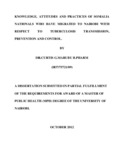| dc.description.abstract | Introduction: The population of Somalia nationals who have migrated to Nairobi contributes significantly to the high prevalence of TB in Nairobi. This group may often have been left out of various studies done because of their 'invisible' nature in terms of access to health services. This justified carrying out a study on their knowledge, attitudes, practices and health seeking behavior with respect to tuberculosis transmission, prevention and control, and from the findings
come up with recommendations on what advocacy, communication, educational, prevention and control strategies need to be put in place.
Objectives: The main objective of the study was to assess their KAP on TB transmission, Prevention and Control. The study also aimed at determining the methods of communication that were the best suited sources of information on TB, for the Somalia nationals who had migrated to Nairobi.
Methods: It was a clinic based cross-sectional KAP study carried out in 10M's two clinics in Nairobi. The main data collected for the study was quantitative in the form of a semi structured questionnaire which was also translated into the Somali language, and completed by the Somali speaking research assistants while interviewing the study participants. Qualitative data was also collected in the form of Focus group discussions to complement the quantitative data.
Results: The majority of the respondents (68.1%) had average knowledge while 27.8% had good knowledge and 4.1 % poor knowledge. The awareness of the majority (57.3%) was average with 42.7% having poor awareness and none having good awareness.93.1 % had good attitude while 6.9% had poor attitude. The majority (87.5%) had good practices or health seeking behavior while for 12.5% it was poor. There was a statistically significant relationship between the
migration status of the Somalia nationals and their Knowledge (p=O.OOO), attitudes (p=O.009) and health seeking behavior and practices (p=O.OOO).There was also a statistically significant relationship between knowledge and household size(p=O.006) Their most preferred source of information on TB was through health care workers(85%), followed by family, friends and neighbors (34.7%) ,community or religious leaders(34%) and electronic media(33%).
However, there was no statistically significant relationship between level of knowledge and the most preferred source of information, which is health workers(p=O.933),but there was a statistically significant relationship between level of knowledge and choice of family or relatives, friends and neighbors as preferred source of information on TB(P=O.OOO) ,community or religious leaders (p=O.007) and Electronic media-Radio, TV(p=O.OOO).There was also no statistically significant relationship between the choice of health workers as a source of information and any of the socio-demographics. There was a statistically significant relationship between practices and level of knowledge (p=O.009) and Overall attitudes (p=O.006).
Conclusion & Recommendations: Migration status is a key factor in determining the KAP on IB of the Somalia nationals who have migrated to Nairobi. Information on TB would best be disseminated through community or religious leaders, family friends, neighbors or the community in general, and electronic media. Their practices and health seeking behavior are determined by their knowledge and attitudes. Some misconceptions or negative attitudes do exist
among this group with regard to various aspects of TB. In addition to this, the minority of study participants who had poor Knowledge, Awareness, Attitudes and Health Seeking behavior also need to be targeted for an effective and successful TB prevention and control program to be realized.
Based on the findings, registration of migrants should be speeded up, so that all Somalia nationals who have migrated to Nairobi are at par, in as far as access to TB services is concerned. The TB educational sessions should be held at the community level or in the mosques facilitated FM, the Somali language radio station. This will help sensitize the Somalia nationals on TB, deal with the negative attitudes that they have on TB and improve their practices and health seeking behavior. | en_US |

